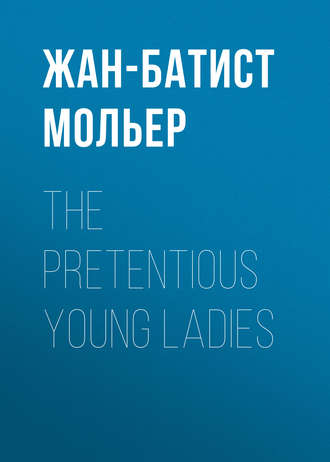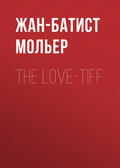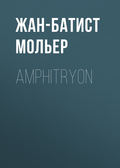
Мольер (Жан-Батист Поклен)
The Pretentious Young Ladies
MAD. Yes, I think that oh! oh! admirable.
MASC. It seems a mere nothing.
CAT. Good Heavens! How can you say so? It is one of these things that are perfectly invaluable.
MAD. No doubt on it; I would rather have written that oh! oh! than an epic poem.
MASC. Egad, you have good taste.
MAD. Tolerably; none of the worst, I believe.
MASC. But do you not also admire quite without heed was I? quite without heed was I, that is, I did not pay attention to anything; a natural way of speaking, quite without heed was I, of no harm thinking, that is, as I was going along, innocently, without malice, like a poor sheep, you I chanced to spy, that is to say, I amused myself with looking at you, with observing you, with contemplating you. Slily your eyes. … What do you think of that word slily– is it not well chosen?
CAT. Extremely so.
MASC. Slily, stealthily; just like a cat watching a mouse —slily.
MAD. Nothing can be better.
MASC. My heart surprise, that is, carries it away from me, robs me of it. Stop thief! stop thief! stop thief! Would you not think a man were shouting and running after a thief to catch him? Stop thief! stop thief! stop thief!
[Footnote: The scene of Mascarille reading his extempore verses is something like Trissotin in Les Femmes savantes (see vol. III.) reading his sonnet for the Princess Uranie. But Mascarille comments on the beauties of his verses with the insolent vanity of a man who does not pretend to have even one atom of modesty; Trissotin, a professional wit, listens in silence, but with secret pride, to the ridiculous exclamations of the admirers of his genius.]
MAD. I must admit the turn is witty and sprightly.
MASC. I will sing you the tune I made to it.
CAT. Have you learned music?
MASC. I? Not at all.
CAT. How can you make a tune then?
MASC. People of rank know everything without ever having learned anything.
MAD. His lordship is quite in the right, my dear.
MASC. Listen if you like the tune: hem, hem, la, la. The inclemency of the season has greatly injured the delicacy of my voice but no matter, it is in a free and easy way. (He sings). Oh! Oh! quite without heed was I, etc.
CAT. What a passion there breathes in this music. It is enough to make one die away with delight!
MAD. There is something plaintive in it.
MASC. Do you not think that the air perfectly well expresses the sentiment, stop thief, stop thief? And then as if some one cried out very loud, stop, stop, stop, stop, stop, stop thief! Then all at once like a person out of breath, Stop thief!
MAD. This is to understand the perfection of things, the grand perfection, the perfection of perfections. I declare it is altogether a wonderful performance. I am quite enchanted with the air and the words.
CAT. I never yet met with anything so excellent.
MASC. All that I do comes naturally to me; it is without study.
MAD. Nature has treated you like a very fond mother; you are her darling child.
MASC. How do you pass away the time, ladies?
CAT. With nothing at all.
MAD. Until now we have lived in a terrible dearth of amusements.
MASC. I am at your service to attend you to the play, one of those days, if you will permit me. Indeed, a new comedy is to be acted which I should be very glad we might see together.
MAD. There is no refusing you anything.
MASC. But I beg of you to applaud it well, when we shall be there; for I have promised to give a helping hand to the piece. The author called upon me this very morning to beg me so to do. It is the custom for authors to come and read their new plays to people of rank, that they may induce us to approve of them and give them a reputation. I leave you to imagine if, when we say anything, the pit dares contradict us. As for me, I am very punctual in these things, and when I have made a promise to a poet, I always cry out "Bravo" before the candles are lighted.
MAD. Do not say another word; Paris is an admirable place. A hundred things happen every day which people in the country, however clever they may be, have no idea of.
CAT. Since you have told us, we shall consider it our duty to cry up lustily every word that is said.
MASC. I do not know whether I am deceived, but you look as if you had written some play yourself.
MAD. Eh! there may be something in what you say.
MASC. Ah! upon my word, we must see it. Between ourselves, I have written one which I intend to have brought out.
CAT. Ay! to what company do you mean to give it?
MASC. That is a very nice question, indeed. To the actors of the hôtel de Bourgogne; they alone can bring things into good repute; the rest are ignorant creatures who recite their parts just as people speak in every-day life; they do not understand to mouth the verses, or to pause at a beautiful passage; how can it be known where the fine lines are, if an actor does not stop at them, and thereby tell you to applaud heartily?
[Footnote: The company of actors at the hotel de Bourgogne were rivals to the troop of Molière; it appears, however, from contemporary authors, that the accusations brought by our author against them were well-founded.]
CAT. Indeed! that is one way of making an audience feel the beauties of any work; things are only prized when they are well set off.
MASC. What do you think of my top-knot, sword-knot, and rosettes? Do you find them harmonize with my coat?
[Footnote: In the original petite oie; this was first, the name given to the giblets of a goose, oie; next it came to mean all the accessories of dress, ribbons, laces, feathers, and other small ornaments. In one of the old translations of Molière petite oie is rendered by "muff," and Perdrigeon (see next note), I suppose, with a faint idea of perdrix, a partridge, by "bird of paradise feathers!!"]
CAT. Perfectly.
MASC. Do you think the ribbon well chosen?
MAD. Furiously well. It is real Perdrigeon.
[Footnote: Perdrigeon was the name of a fashionable linen-draper in
Paris at that time.]
MASC. What do you say of my rolls?
[Footnote: According to Ash's Dictionary, 1775, canons, are "cannions, a kind of boot hose, an ancient dress for the legs."]
MAD. They look very fashionable.
MASC, I may at least boast that they are a quarter of a yard wider than any that have been made.
MAD. I must own I never saw the elegance of dress carried farther.
MASC. Please to fasten the reflection of your smelling faculty upon these gloves.
MAD. They smell awfully fine.
CAT. I never inhaled a more delicious perfume.
MASC. And this? (He gives them his powdered wig to smell).
MAD. It has the true quality odour; it titillates the nerves of the upper region most deliciously.
MASC. You say nothing of my feathers. How do you like them?
CAT. They are frightfully beautiful.
MASC. Do you know that every single one of them cost me a Louis-d'or?
But it is my hobby to have generally everything of the very best.
MAD. I assure you that you and I sympathize. I am furiously particular in everything I wear; I cannot endure even stockings, unless they are bought at a fashionable shop.
[Footnote: Without going into details about the phraseology of the précieuses, of which the ridiculousness has appeared sufficiently in this scene, it will be observed that they used adverbs, as "furiously, terribly, awfully, extraordinarily, horribly, greatly," and many more, in such a way that they often appear absurd, as, "I love you horribly," or, "he was greatly small." Such a way of speaking is not unknown even at the present time in England; we sometimes hear, "I like it awfully," "it is awfully jolly."]
MASC. (Crying out suddenly). O! O! O! gently. Damme, ladies, you use me very ill; I have reason to complain of your behaviour; it is not fair.
[Footnote: I employ here the words "to have reason," because that verb, in the sense of "to have a right, to be right," seems to have been a courtly expression in Dryden's time. Old Moody answers to Sir Martin Marall (Act iii., Scene 3), "You have reason, sir. There he is again, too; the town phrase; a great compliment I wise! you have reason, sir; that is, you are no beast, sir." ]
CAT. What is the matter with you?
MASC. What! two at once against my heart! to attack me thus right and left! Ha! This is contrary to the law of nations, the combat is too unequal, and I must cry out, "Murder!"
CAT. Well, he does say things in a peculiar way.
MAD. He is a consummate wit.
CAT. You are more afraid than hurt, and your heart cries out before it is even wounded.
MASC. The devil it does! it is wounded all over from head to foot.
SCENE XI. – CATHOS, MADELON, MASCARILLE, MAROTTE
MAR. Madam, somebody asks to see you.
MAD. Who!
MAR. The Viscount de Jodelet.
MASC. The Viscount de Jodelet?
MAR. Yes, sir.
CAT. Do you know him?
MASC. He is my most intimate friend.
MAD. Shew him in immediately.
MASC. We have not seen each other for some time; I am delighted to meet him.
CAT. Here he comes.
SCENE XII. – CATHOS, MADELON, JODELET, MASCARILLE, MAROTTE, ALMANZOR
MASC. Ah, Viscount!
JOD. Ah, Marquis! (Embracing each other).
MASC. How glad I am to meet you!
JOD. How happy I am to see you here.
MASC. Embrace me once more, I pray you.
[Footnote: It was then the fashion for young courtiers to embrace each other repeatedly with exaggerated gestures, uttering all the while loud exclamations. The Viscount de Jodelet is the caricature of a courtier of a former reign; he is very old, very pale, dressed in sombre colours, speaks slowly and through the nose. Geoffrin, the actor, who played this part, was at least seventy years old.]
MAD. (To Cathos). My dearest, we begin to be known; people of fashion find the way to our house.
MASC. Ladies, allow me to introduce this gentleman to you. Upon my word, he deserves the honour of your acquaintance.
JOD. It is but just we should come and pay you what we owe; your charms demand their lordly rights from all sorts of people.
MAD. You carry your civilities to the utmost confines of flattery.
CAT. This day ought to be marked in our diary as a red-letter day.
MAD. (To Almanser). Come, boy, must you always be told things over and over again? Do you not observe there must be an additional chair?
MASC. You must not be astonished to see the Viscount thus; he has but just recovered from an illness, which, as you perceive, has made him so pale.
[Footnote: Molière here alludes to the complexion of the actor
Geoffrin.]
JOD. The consequence of continual attendance at court and the fatigues of war.
MASC. Do you know, ladies, that in the Viscount you behold one of the heroes of the age. He is a very valiant man.
[Footnote: In the original un brave à trois poils, literally, "a brave man with three hairs." This is an allusion to the moustache and pointed beard on the chin, then called royale. We have seen the fashion revived in our days by the late emperor of the French, Napoleon III. and his courtiers; of course, the royale was then called impériale.]
JOB. Marquis, you are not inferior to me; we also know what you can do.
MASC. It is true we have seen one another at work when there was need for it.
JOD. And in places where it was hot.
MASC. (Looking at Cathos and Madelon). Ay, but not so hot as here. Ha, ha, ha!
JOD. We became acquainted in the army; the first time we saw each other he commanded a regiment of horse aboard the galleys of Malta.
MASC. True, but for all that you were in the service before me; I remember that I was but a young officer when you commanded two thousand horse.
JOD. War is a fine thing; but, upon my word, the court does not properly reward men of merit like us.
MASC. That is the reason I intend to hang up my sword.
CAT. As for me, I have a tremendous liking for gentlemen of the army.
[Footnote: Cathos, who only repeats what her cousin says, and has observed that Mascarille admires Madelon, is resolved to worship more particularly the Viscount de Jodelet.]
MAD. I love them, too; but I like bravery seasoned with wit.
MASC. Do you remember, Viscount, our taking that half-moon from the enemy at the siege of Arras?
[Footnote: Turenne compelled the Prince de Condé and the Spanish army to raise the siege of Arras in 1654.]
JOD. What do you mean by a half-moon? It was a complete full moon.
MASC. I believe you are right.






